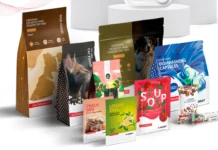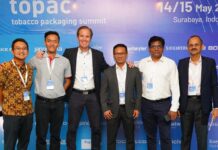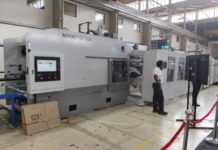Bobst and its partners have announced a key milestone in their pioneering work to replace non-recyclable high barrier multi-material packaging structures with mono-material alternatives designed for recycling.
The launch of a new generation of Bobst ‘hero samples’ represents a significant achievement in the mission to deliver state-of-the-art solutions utilizing a new generation of polymers.
After several different samples of mono-material standup pouches (MDO PE, BOPE, BOPP and CPP) were launched at K 2019, the partners involved have continued their considerable investment and intense research to progress the samples even further, to ensure all industry requirements are met in terms of processability, barrier, safety, and optical quality.
“Finding sustainable alternatives to non-recyclable plastics is one of the most important challenges of our times,” said Nick Copeland, R&D director at Bobst. “It is a particular challenge for flexible packaging such as that used for food packaging, where the high barrier protection against oxygen and water that prevents deterioration is currently provided by multi-layer, multi-material packaging, which cannot be recycled. This next generation of high barrier mono-material structures brings us one step closer to being able to provide completely recyclable solutions to replace non-recyclable packaging.”
“Brückner is convinced that the future will continue to belong to plastics if they are used and reused sustainably,” said Helmut Huber, chief operating officer Sales & Project Management, Brückner Maschinenbau. “As part of a circular economy, the undeniable advantages of plastic can be combined absolutely well with the sustainability goals of a modern society. Regarding the discussions about recycling targets for plastic packaging, we see mono-material packaging structures clearly on the rise.”
Bobst’s ‘Generation 2.0’ samples
The samples include:
- New ultra-high and high barrier full polypropylene laminated pouches, printed in gravure and recyclable, with the option of an AluBond metallized barrier or transparent AlOx (aluminum oxide) barrier layer and solvent-free barrier adhesive and/or topcoat.
- The first-ever UV flexo combined with digital inkjet printing on full polypropylene laminated bags with AluBond metallization and barrier performances, using a solventless adhesive again for a mono-material pouch designed for recycling.
- UV low migration flexo printing on full low-density polyethylene laminated pouches providing barrier with AluBond metallization.
- CI flexo water-based printing on full MDO-PE laminated pouches with AluBond metallization, providing ultra-high barrier using a high barrier solventless adhesive.
Bobst project partners
Every project partner has played an essential role in achieving this important milestone to develop and industrialize a series of new mono-material solutions.
- Dow is a global supplier of major polyethylene (PE) resins and represents the first step in the Generation 2.0 samples’ production chain.
- BrücknerMaschinenbau is the market leader for biaxial (BO) film stretching lines. With Brückner’s R&D competence, the good performance of the BO films regarding barrier values and processability could be achieved.
- Hosokawa Alpine is a supplier in the field of blown film extrusion and an expert in MDO (Machine Direction Orientation) technology, a crucial component in manufacturing high-performance single-material compounds made of polyethylene.
- Elba develops and manufactures automatic high-speed bag and pouch-making machines. The company converts the finished reels into pouches.
- Sun Chemical is a global enterprise in inks, coatings, pigments, and advanced materials, and provides the sustainable oxygen barrier solventless adhesives used in the program.
- Michelman develops and manufactures specialized sustainable chemistries used in digital printing and foodservice packaging and they supplied the water-based barrier topcoat used in part of the project.
- Indopoly manufactures a wide range of Biaxially Oriented Polypropylene (BOPP) films for the flexible packaging industry and supplied a BOPP film with a special skin layer for one of the pouches.
- UFlex is India’s largest flexible packaging and oriented film (BOPET & BOPP) company and supplied the BOPP film used in some of the tests.
“Recyclability brings a major layer of complexity to designing efficient and effective packaging. We strongly believe that collaboration with the whole value chain is not only the fastest, but the only way to help accelerate the market moving towards ambitious sustainability targets,” said Jaroslaw Jelinek, Global Marketing manager for oriented PE technologies at Dow Packaging & Specialty Plastics. “We are delighted to be part of this knowledgeable and innovative project team and to bring the next generation solutions to the market.
“Sun Chemical is committed to contributing to a more circular economy and is dedicated to supporting the flexible packaging industry to becoming more sustainable,” commented Nicolas Bétin director of Product Strategy EMEA, Packaging Inks & Materials & Global Sustainability Business leader. “Close collaboration between the various players in the value chain, sharing knowledge and competence, can lead to tangible results which can efficiently be implemented in the market. This is precisely the case of this co-operation”.
“This is a partnership of like-minded companies, who are all determined to develop sustainable alternatives to non-recyclable flexible packaging,” commented Nick Copeland. “The Bobst Competence Centers are used to test the viability of the materials in terms of their barrier, printing and lamination, to ensure they can cope throughout the production process. We are thrilled to contribute to this important milestone.”











